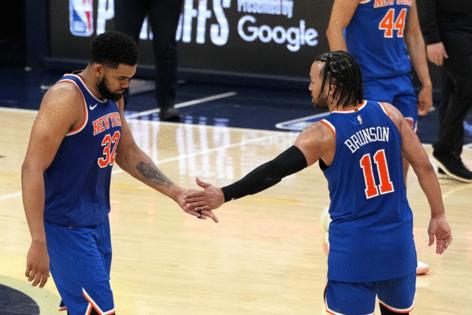Kristian Winfield: The Knicks have a problem -- and it's too late to solve it
Published in Basketball
INDIANAPOLIS — The Knicks have a problem. In fact, they have two. The first is the most pressing: Their two-best players are poor defenders. Jalen Brunson and Karl-Anthony Towns are all-world scorers. They are two of the best offensive players at their position the game has ever seen. But they are hunted on defense so frequently — and so surgically — that it makes it near impossible to play them in tandem long stretches at a time against an offense as potent as the Pacers.
The second problem? The Knicks’ best stretches in the Eastern Conference finals against a Pacers team now up 3-1 have come with Towns on the floor without Brunson, the 36th captain in franchise history, the very player who powered the Knicks to consecutive 50-win seasons and their first conference finals appearance in the last 23 years. Because when Brunson is off the floor, the Knicks have no choice but to move the ball to generate offense. And in those scenarios — Towns in, Brunson out — the Knicks seek their All-Star big man in ways they do not with their starters on the floor.
The All-Star duo of Towns and Brunson entered Game 4 against the Pacers with a playoff net rating of minus-4.1, or they were outscored by 4.1 points for every 100 possessions they spent on the floor together. On Tuesday, the Knicks, for the second game in a row, were most competitive against the Pacers in minutes they surrounded Towns with four capable defenders.
By the 5:42 mark of the fourth quarter, Brunson had a net rating of minus-20. Towns boasted a net rating of minus-one. And Delon Wright — who has routinely ranked among the league leaders in deflections as one of the NBA’s more active perimeter defenders — boasted a positive net rating of plus-11 in nine minutes of play.
Yet in the fourth quarter, Wright was nowhere to be found. And instead, head coach Tom Thibodeau went back to his starters. Not the new-look starters with Towns and Mitchell Robinson creating a clear size advantage — but the old starters who’d been outscored at a rapid rate during these playoffs. And he stuck with Josh Hart, who did fill up the stat sheet (12 points, 11 rebounds) even though he turned the ball over five times and committed several unnecessary fouls before disqualifying himself with 1:44 left in the fourth quarter.
Add it all up and you don’t get enough. Not against a Pacers team that’s proven to be far from the fluke they were written-off as after pulling away from the injury-riddled Knicks in Game 7 of the second round last year. The Knicks were the healthiest team in all of basketball this season, and the players on the floor in these conference finals were the very ones they bet could get the job done this time around.
They were wrong.
And now, the Knicks could face some painful questions during the offseason — an offseason now swiftly approaching for a team that finds itself in a 3-1 hole only 4.4% of teams in playoff history have ever comeback from in a series.
The Knicks were constructed to beat the Boston Celtics. They put together two of the best 3-and-D wings (Mikal Bridges and OG Anunoby) then traded for Towns to create a five-out offensive system many teams in the league deploy.
But their critical flaws are just that — critical, and while it’s easy to gloss over the shortcomings during the regular season, playoff basketball is all about winning on the margins. About exposing a team’s biggest weaknesses. About picking at a scab over and over until it bleeds profusely from the same spot.
There was bloodshed on the Gainbridge Fieldhouse floors late Tuesday night, literally and figuratively, for a team that didn’t just lose the game. They may have also lost Towns, who bumped knees with Aaron Nesmith late in the fourth quarter and gutted through a noticeable limp the remainder of the game before hobbling into the locker room after the final buzzer sounded.
This series is not over. If anyone can come back from down 3-1, it’s the team that plays its best basketball when its backs are against the wall, when it faces a 20-point deficit, or when it has to look itself in the mirror after a disappointing loss.
But what do the Knicks see when they look in the mirror? Do they see a team that can weather the storm the Pacers have summoned in this series?
Or do they see what the rest of the world sees? A team whose shortcomings are baked into the fiber of its roster. A team that has to play one of its two-best players at a time to have a shot at slowing down a Pacer offense that has exposed the Knicks biggest problem.
A problem they have run out of time to solve.
©2025 New York Daily News. Visit at nydailynews.com. Distributed by Tribune Content Agency, LLC.







Comments